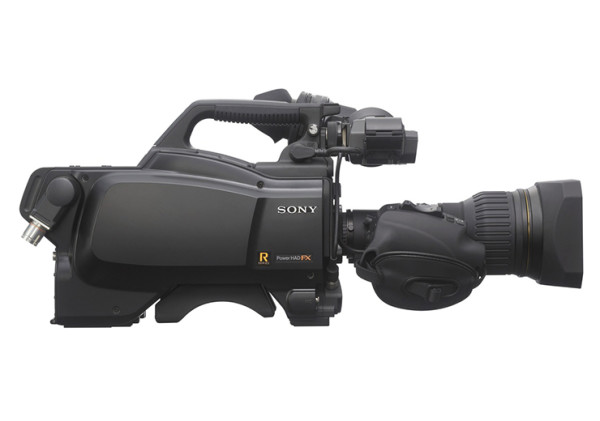
HSC-100R
Excellent picture quality for High Definition production over digital triax
The HSC-100R incorporates digital triax technology and is equipped with sophisticated 16-bit A/D conversion circuitry as well as superb three 2/3-inch CCDs to bring out a high level of picture quality over conventional digital triax infrastructures. The camera also has a built-in high-quality down-convertor for superior SD images, as standard.
Multi-format operation
A wide range of capturing modes are available including 1080/29.97PsF* and 1080/25PsF*1 as well as 1080/50i, 1080/59.94i, 720/50p, 720/59.94p, 576/50i, and 480/59.94i.
br>* Optional HZC-PSF3 software is required.
Sophisticated 2/3-inch CCDs
The HSC Series camera is equipped with field-proven 2/3-inch type full-resolution 1920 x 1080 CCDs. Due to Sony’s advanced sensor technologies, the CCD imager offers a high sensitivity of F10 for 59.94 Hz and F11 for 50 Hz with a remarkable signal-to-noise ratio (S/N) of -60 dB (HD) for high-quality pictures in all kinds of demanding shooting environments.
High-quality 16-bit A/D conversion and DSP LSI
The HSC Series camera incorporates a high-performance 16-bit A/D converter with the latest technologies that enables captured images to be processed with maximum precision. Also, the Auto Lens Aberration Compensation function can optimise lens performance to provide stunning picture quality.
Digital Extender function
Digital Extender function expands the size of the image by a factor of 2 in the centre of captured images by the image sensor. This function works without decrease in sensitivity, such as F-number drop, which occurs by the use of conventional optical extender functions.
Auto Lens Aberration Compensation 2 (ALAC2) function
The ALAC2 function automatically reduces lens chromatic aberration by both horizontal and vertical compensation when a lens supporting ALAC2 function is attached.
Versatile camera interfaces
The HSC Series camera provides a wide range of inputs and outputs via the connector panel such as HD-SDI output, SD-SDI output, VF signal, return signal, and SDI Prompter signal. An intercom channel (ENG/PROD) is also provided.
Digital triax operation
The HSC-100R utilises a very high-quality digital triax system that expands its operability in field applications, as well as for studio production. This digital triax system can be integrated into conventional triax-based infrastructures, enabling an easy upgrade from existing systems. The latest digital triax transmission system offers long cable runs of up to 1200 m via ø14.5 mm cable between the camera and the HSCU-300R.
* The maximum cable length depends on the camera system configuration, lens type, and the number of cable connections.
Simple and yet versatile system configuration
The HSC Series camera offers flexible configuration with the highly compact 1.5 RU-size HSCU-300R and HSCU-300RF Camera Control Units, creating a standardised 19-inch rack system that is ideal for space-limited production areas. When the front panel of the HSCU-300R or HSCU-300RF is replaced with the optional CCU Front Control Panel HKCU-FP2, a simple remote control system can be configured. Many functions of the camera can be controlled by the control knobs and switches on the HKCU-FP2.
Furthermore, when the optional HZCU-MC3 camera operating software is installed, the HSCU-300R and HSCU-300RF allows the HSC-300R/100R and HSC-300RF/100RF respectively to be controlled by a MSU-1000/1500 Master Setup Unit or RCP-1000 series Remote Control Unit, enabling the camera to be used as a simple studio system or as part of a large-scale broadcasting system consisting of multiple cameras.
Robust design
In order to survive the stresses of professional use, the main chassis of the HSC Series is made of a magnesium-alloy casting. This rigid body makes the camera highly durable and helps to protect its lightweight precision components such as the integrated optical and electronics.
Position-adjustable shoulder pad
The position of the shoulder pad can be adjusted – either forwards or backwards – to provide users with the optimum weight balance. This is particularly useful when the camera is docked with any type of lens or camera adaptor. In addition, no tool is required for this adjustment.
Two types of Focus Assist functions
Viewfinder Detail: adds dedicated image-enhancing edge signals directly to the viewfinder for a camera operator to recognise a focusing point.
Focus Assist Indicator: displays an indicator for adjustment at the bottom or other position of the viewfinder frame. It’s beneficial especially when shooting by wide-viewing angle.
Optimised handle shape for stable shooting
The designed carrying handle enhances the camera’s operability. A protrusion positioned on the front of the handle enables users to hold the camera with added stability while shooting. In addition, the non-slip structure of its lower surface helps users to grasp the handle firmly.
Function-assignable switches
The HSC Series camera has dedicated ‘assignable switches’ available for frequently used functions. Located on both the side and rear panels, these switches allow functions such as electronic colour-temperature conversion to be assigned as required. Buttons on the handle are also available as function-assignable switches. All of these switches greatly enhance the camera’s operational convenience.
HD to SD down-convertor
The camera is equipped with a built-in high-quality down-convertor for superior SD images, as standard.
Selection of multiple gamma tables
In addition to artistic and skilful lighting, in-camera gamma setting plays an important role in dealing with contrast range and giving a specific “look” to an image. In order to meet a broad array of customer demands, seven types of standard-gamma and four types of hyper-gamma tables are provided.
HyperGamma
HyperGamma is a set of new transfer functions designed to provide powerful contrast handling by making maximum use of the capacity and wide dynamic range of the CCD sensor. These functions are quickly accessed via the set-up menu, and camera operators can select one curve from a choice of four that best suits their needs and conditions. For example, they can select to enhance natural reproduction in low-key areas to achieve greater flexibility in wide dynamic scenes.
Multi-matrix function
The multi-matrix function of the HSC Series cameras allows colour adjustments to be applied over the colour range specified by the operator. The colour spectrum is divided into 16 areas of adjustment, where the hue and/or saturation of each area can be modified. This function is especially useful when only the hue of certain colours needs to be adjusted for special-effects work. Multi-matrix is extremely effective for capturing images with similar colour tone in a system configured with existing SD cameras or other models of camera. This function enables the picture from another model of camera to be easily matched.
Adaptive-matrix function
This enables ideal colour conversion for shooting even under excessively strong ambient lighting conditions such as live shooting under bright monochromatic blue light. These conditions would typically cause a conventional matrix function to exceed the colour conversion range.
Master White Gain function
The Master White Gain function
of the HDC Series of cameras enables step-less adjustment of gain levels. This makes it possible to adjust the gain level more precisely compared to conventional stepwise adjustment.

